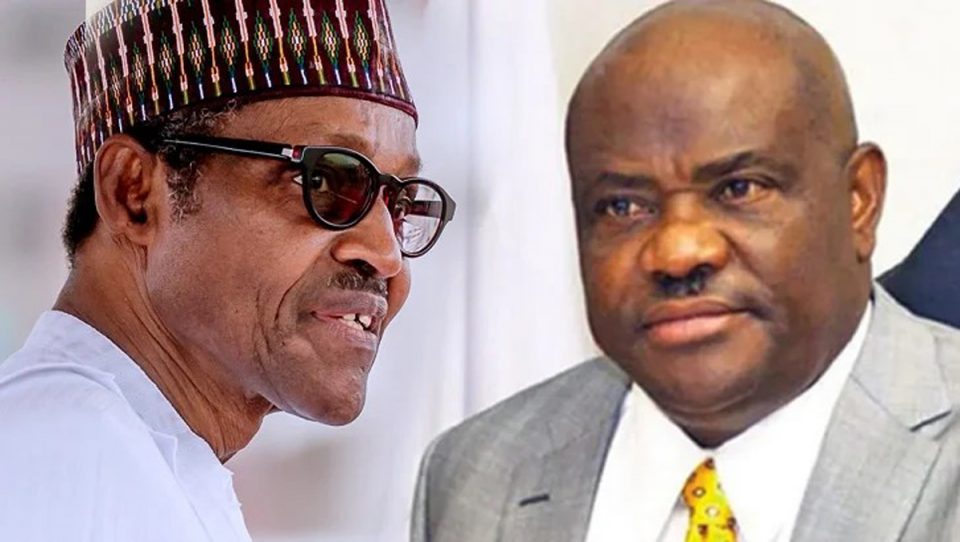Rivers State Governor, Nyesom Wike, has alleged that the exclusion of other regions in the country from key appointments and absence of social justice were some of the factors causing unrest and violence in the country.
He argued that the Federal Government, as presently constituted, had failed to provide responsible government, which he said, necessitated sustainable governance.
Wike stated this during a lecture titled: Governance, Security and Sustainable Development In Africa, Nexus, Challenges And Prospects: Rivers State As Metaphor at the National Institute for Security Studies (NISS), Abuja.
During the lecture, participants of the Executive Intelligence Management Course (EIMC 14), who are rounding off their studies at the NISS, prior to the award of fellow of security institute (fsi), cheered Wike for his insight and courage in distilling national issues.
“The President Muhammadu Buhari administration cannot be said to be a responsive government that will provide all these, because the government of the day gives one excuse or the other for it failures.
“It is terrible. So, in the absence of a responsive government, there cannot be environmental sustainability because, it requires good governance.
“When the President said over 90 per cent will go to only those who voted for him, that alone can create crisis. That is not the hallmark of good governance. I don’t expect a President of a country to say that he will only recognise those who voted for him. That is not democracy,” he stated.
Wike argued that social justice and equity was fundamental to achieving peace, security and sustainable development, which only good governance could achieve.
He lamented that poor governance at the centre and bad leadership model had continued to characterise Africa’s political, socio-economic and security landscapes.
He insisted that zoning of political position at the state and federal levels represented equity, which he said, ensured peace in any clime, adding: “But the moment anyone begins to think that the position he occupies is exclusive to him, there will be crisis, which ultimately leads to insecurity.
Citing the instance when the Igbo were complaining against marginalisation in appointments into key positions in the country’s security agencies, he said with insecurity, which had assumed frightening dimension, Nigeria could not achieve sustainable development.
Insisting that there was nothing wrong in listening to the Igbo, he said:
“What is wrong in sitting back and say, we are all one and we want this country to be together for us to achieve sustainable development?
“Because if the Igbo and other sensitive parts of the country like the Niger Delta region are alienated from the core of the country’s political and socio-economic considerations, they will begin to believe that they do not belong to the system.”
Senate summons freight agents over illegal cargo charges
The Senate has commenced moves to stop processing delay and illegal charges on cargo transport by freight agents in Nigeria.
The decision to end multiple charges on cargo processing and transport was reached by the upper chamber in a resolution following consideration of a motion during plenary on Wednesday.
This was sequel to the consideration of a motion tilted, “The need to streamline Import and Export Cargo Processing in the Aviation Sector,” sponsored by Senator Bala ibn Na’Allah (Kebbi South).
The Senate, accordingly, mandated the joint committees on Trade and Investment, Agriculture and Rural Development, and Aviation and Customs to summon stakeholders and freight agents to come up with acceptable template of processing Nigeria’s imports and exports.
Rising under Order 42 and 52 of the Senate Standing Rules, Na’Allah noted with dismay the loss of about N250bn on agro-export of produce in the country.
The lawmaker said the loss which translated to a ratio of 87:13 continued to impact negatively on the country’s economy.
Na’Allah noted that there were about 16 sundry charges for goods coming in or out of the country – with 16 in Lagos and 15 in Abuja – and many of them being unofficial and illegal.
He lamented that loading 100 tonnes of cargo on aircraft cost around $35,000 in Nigeria, compared to Ghana that cost just about $4000.
He said, “This has caused substantial damage to the Federal Government efforts of stimulating capital inflow.”
He added that airlines involved in cargo transport had started avoiding Nigeria in view of the prohibitive charges.




